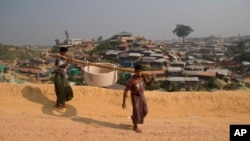The failed attempt to send thousands of Rohingya back to Myanmar starting this month has drawn attention to alleged violence and intimidation by security forces against members of the Muslim minority living in Bangladesh's sprawling refugee camps.
Bangladesh has boosted its international reputation by hosting more than 730,000 Rohingya who fled a vicious campaign by Myanmar’s military last year that U.N. investigators have labelled genocide - an accusation Myanmar has consistently denied.
But Bangladesh appears keen to demonstrate that Rohingya refugees will not be welcome there indefinitely. The planned repatriations sparked fear and chaos last week as Rohingya went into hiding - and in a handful of reported cases attempted suicide - to avoid being sent back.
Meanwhile, allegations of sporadic beatings, looting and intimidation by Bangladeshi soldiers, police and camp officials have underscored the bleak conditions faced by Rohingya in their host country, where most are denied official refugee status and face restrictions on freedom of movement.
The repatriation of some 2,000 refugees was scheduled to begin last Thursday, but Bangladesh has now put the plans on hold until next year after failing to find any Rohingya willing to go back.
Rohingya in the camps have told VOA that soldiers were stationed near the homes of those who were told they would be sent back last week, fueling fears of forced repatriation and adding to widespread distress in communities already suffering extreme trauma after last year’s violence.
One Rohingya man told VOA anonymously that block leaders in the camps were also “announcing with loudspeakers... that it's essential for everyone to carry ID with them whenever and wherever they go if they leave their homes.”
Late last month, security forces looted property from Rohingya shopkeepers at the Balukhali camp, said John Quinley, a human rights specialist with the non-profit organization Fortify Rights.
“Right now the security forces are operating in the camps with total impunity,” he said.
In another case earlier this month, Fortify Rights reported that security forces rounded up 18 Rohingya leaders and slapped and hit some of them while telling them to instruct other refugees to cooperate with a new U.N.-backed project to provide them with “smart cards.”
Many Rohingya oppose the identity cards because they fear the information on them will be shared with the Myanmar government.
Bangladesh’s refugee, relief and repatriation commissioner, Abul Kalam, told VOA he was unaware of the allegations of violence but would follow up. "Generally, it is not acceptable that someone would apply force on or beat someone to do or not to do something," he said.
Quinley called on the U.N.’s refugee agency to “do everything in their power to make sure that the Bangladeshi authorities are respecting human rights.”
Spokesperson Caroline Gluck said the agency has notified the authorities of a “small number” of reports of violence related to the smart card project. The agency has “been following up with them to ascertain the circumstances of what happened,” she told VOA.
Officials have responded that the incidents were "not linked" to the smart card project, she said.
She added, “The new ID card will enable refugees to be better protected and will streamline access to assistance and services.”
Mohammed Sheikh Anwar, a Rohingya activist, told VOA the Bangladeshi government “needs to keep the lower-level authorities in check. There should be an accountability measure.”
“Committing violence against genocide survivors to make them agree to the authorities' terms is not the solution,” he added.
Last week a Rohingya man named Ata Ullah said he was beaten at the office of an official at the Chakmarkul camp, the Guardian reported, after he failed to provide the official with a list of refugees.
Ata Ullah said in a video circulated on social media that when he couldn’t provide the official with a list he “was beaten with a large stick... they stepped on my neck, I could not stand it.”
Human Rights Watch warned in a report in August that the Bangladeshi government was restricting access to basic services by resisting attempts by aid agencies and Rohingya refugees to “create any structures, infrastructure, or policies that suggest permanency.”
As a result, the report said, “refugee children do not go to school, but rather to ‘temporary learning centers,’ where ‘facilitators,’ not ‘teachers,’ preside over the classrooms. The learning centers are inadequate, only providing about two hours of instruction a day,” the report said.




